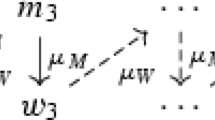Abstract
Stability of matchings was proved to be a new cooperative equilibrium concept in Sotomayor (Dynamics and equilibrium: essays in honor to D. Gale, 1992). That paper introduces the innovation of treating as multi-dimensional the payoff of a player with a quota greater than one. This is done for the many-to-many matching model with additively separable utilities, for which the stability concept is defined. It is then proved, via linear programming, that the set of stable outcomes is nonempty and it may be strictly bigger than the set of dual solutions and strictly smaller than the core. The present paper defines a general concept of stability and shows that this concept is a natural solution concept, stronger than the core concept, for a much more general coalitional game than a matching game. Instead of mutual agreements inside partnerships, the players are allowed to make collective agreements inside coalitions of any size and to distribute his labor among them. A collective agreement determines the level of labor at which the coalition operates and the division, among its members, of the income generated by the coalition. An allocation specifies a set of collective agreements for each player.
Similar content being viewed by others
References
Barberà S, Dutta B (2000) Incentive compatible reward schemes for labour-managed firms. Rev Econ Des 5: 111–127
Bikhchandani S, Mamer JW (1997) Competitive equilibrium in an exchange economy with indivisibilities. J Econ Theory 74(2): 385–413
Crawford VP, Knoer EM (1981) Job matching with heterogeneous forms and workers. Econometrica 49: 437–450
Fagebaume A, Gale D, Sotomayor M (2009) A note of the multiple partners assignment game. J Math Econ. doi:10.1016/j.jmateco.2009.06.014
Gale D (1960) The theory of linear economic models. McGraw Hill, New York
Gale D, Shapley L (1962) College admissions and the stability of marriage. Am Math Mon 69: 9–15
Gul F, Stacchetti E (1999) Walrasian equilibrium with gross substitutes. J Econ Theory 87: 95–124
Kelso A, Crawford VP (1982) Job matching, coalition formation, and gross substitutes. Econometrica 50: 1483–1504
Shapley L, Shubik M (1972) The assignment game I: the core. Int J Game Theory 1: 111–130
Sotomayor (1992) The multiple partners game. In: Majundar M (ed), Dynamics and Equilibrium; Essays in honor to D. Gale. Mcmillian, pp 322–336
Sotomayor: (1999a) The lattice structure of the set of stable outcomes of the multiple partners assignment game. Int J Game Theory 28: 567–583
Sotomayor (1999b) Three remarks on the many-to-many stable matching problem. Math Soc Sci 38: 55–70
Sotomayor (2007) Connecting the cooperative and competitive structures of the multiple-partners assignment game. J Econ Theory 134: 155–174
Sotomayor (2009) Adjusting prices in the many-to-many assignment game. Int J Game theory. doi:10.1007/s00182-009-0171-8
Author information
Authors and Affiliations
Corresponding author
Additional information
This paper was motivated from discussions with David Gale (1921–2008) in 1990. The main ideas were developed and elaborated and new ones were incorporated during my stay at Brown University in the fall of 2008. We thank two anonymous referees for their suggestions and helpful comments which contributed to the improvement of this work. This paper was partially supported by CNPq-Brazil.
Rights and permissions
About this article
Cite this article
Sotomayor, M. Stability property of matchings is a natural solution concept in coalitional market games. Int J Game Theory 39, 237–248 (2010). https://doi.org/10.1007/s00182-009-0206-1
Accepted:
Published:
Issue Date:
DOI: https://doi.org/10.1007/s00182-009-0206-1




